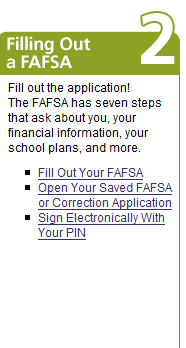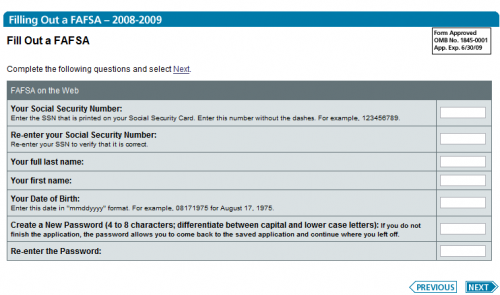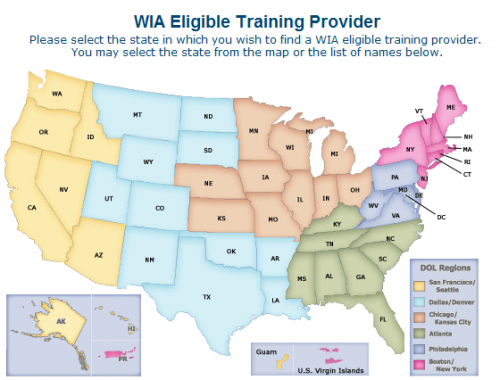How To Get A Free Government Educational Grant
You've seen the infomercials on getting "Government Grants" and "Free Money". I've bought the books myself just to see if I weren't missing out on something.
As someone who works in the education and training "system" helping people get money for career training every day, I want to tell you the facts, OK? You don't even have to buy an expensive book on "Government Grants"! But IF you are eligible for training through a government grant, I will tell you how to find out in short order.
What are my credentials for telling you this? Simple. I've been in this business 7 years and for every day of that time, it was my job to help people obtain the career training they needed. I've helped hundreds of people wade through the process, so that's why I can tell you what I know so save you time, money and frusration.
Here are the basic types of government grant for career training I deal with daily:
Pell Grants
Lottery Grants
Scholarships through local Career Centers
There may be other free government educational grants that come and go, but these are the "bread and butter" of the system currently.
NO government educational grant given for training purposes provides for LIVING EXPENSES or BUSINESS START UP CAPTIAL They only go to pay for tuition and books.
Here's how to see what you qualify for (if anything):
Note: I suspect these web addresses will remain the same indefinitely. But the websites themselves may change. The concepts, however, will remain the same though the screen shots may be different when you arrive at the site.
Step 1: Pell Grants
With your last year's tax return handy, go to http://www.fafsa.ed.gov
I suggest you use a high speed connection and have a printer available because you want to make copies of your submission and to print a signature page. You will mail the signature page to attest to the information you submit online. So you'll need a printer for two reasons.
The FAFSA (Pell Grant) home page looks like this currently:

Here's where you can apply for a Pell grant.
You click the link to fill out your FAFSA that looks like this:

Mid way down the next page, you then select the academic year you're requesting funding for. I'm writing this in April 2008. The next academic year is 2008-2009 starting next July basically.

Now you'll start filling out all the pages. Here's what the first one looks like.

After you're done, you click next and you'll have to have your latest tax return handy.
The online application will ask you what you what type of return you filed (1040, 1040EZ, etc.) and what you reported to the IRS on specific lines. Just enter what you reported to the IRS on each page and keep clicking "next" at the bottom of the page.
Finally you'll be able to print out a copy of your entries, print a signature page that you mail in, and request a PIN number so you don't have to keep mailing in signature pages in the future.
Here's what happens after they verify your signature.
You receive your PIN number. Keep this handy along with the username and password you create.
You will receive a determination letter to tell if you are eligible for a PELL grant based on last year's tax returns.
Even if you aren't eligible based on your tax return, keep in mind you may be able to have the local financial aid office appeal the decision if your income has dropped significantly since that tax return.
Step 2: Lottery Grants
In addition to any free government grant money you may be eligible for through the Pell Grant, this same process of applying for the Pell Grant lets you know if you may be eligible for in the way of a Lottery Grant.
If your state has a lottery, it's possible money is set aside for higher education. They may or may not be called a "lottery grant" officially, but we know where the money comes from.
In Tennessee , for example, these are called by several names depending on the student's field of study. "Wilder-Naifeh Funds" are for technical schools. "Hope Scholarships" are for college students. If you go to a college there's one set of requirements and there are virtually no requirements for getting a technical education grant except that you be admitted to the school.
Just because you do not obtain a Pell Grant does not mean you cannot get a lottery grant!
The process for getting such grants is to follow Step 1 and complete your FAFSA or Pell Grant application!
Step 3: Career Center Scholarships
If your Pell Grant allotment and a Lottery Grant don't pay all the costs of your training, then there's one more way commonly used to obtain training, a training award or scholarship obtained through a federally funded Career Center. Click here to find one near you.
These scholarships (a form of free government grant) are available to laid off workers (the technical term is "dislocated worker") and basically any adult able to legally work in the United States. That means you must have a "Green Card" or be a citizen. And if you're a male, you must have registered for Selective Service . The same is true for Pell Grants too.
These grants only pay for books and tuition, but the Career Centers may have other "support" funds available for other expenses that help the customer actually go to work. These grants do not cover living expenses or business start up expenses like the purchase of equipment. They are for skill aquisition only.
This brings up another point.
If you expect to obtain 100% government funding for your education, you are not going to Harvard or other expensive private school. You can expect to find funding for 2 year programs that leave you "job ready".
That means you should confine your search to "Eligible Training Providers" . The search page currently looks like this:

Once there, click on the state you are planning to train in and you can see all the programs for which Career Center Scholarship are available.
The Career Center will need to verify with the school what you actually need to receive to pay for your training. Their funds, if available, will supplement whatever funds are available to you through Pell Grants, Lottery Grants, and any other scholarship the Financial Aid officer may direct you to.
The best time to obtain them may be soon after the fiscal year change (July 1st) because funds do run out as scholarships are funded through the year.
Career Center Scholarships are not automatic. They depend on the availability of funds AND a variety of other factors affected by both federal law and federal, state, and local policies that may vary from state to state or change from time to time.
At the Career Center level, you will likely be required to prove you are suitable for the training. They won't fund you to be a "brain surgeon" if you're cut out by skills and temperment to be a "tree surgeon". (They won't fund you to be a brain surgeon anyway because it costs too much, but you get the picture.)
You may be required to provide proof of your GED or high school equivalency. You may also be required to do a variety of assessments that show, for example, your proficiency in Applied Math, Reading for Information, and Locating Information. You may be required to earn a "Career Readiness Certificate" as part of the process.
You may also be asked to help prove that you are training for a "job in demand". Use the Career One Stop site to prove through Labor Market Information that the skills you want to acquire WILL help you get a job.
Again, funds are subject to availabilty and a number of other internal policies and procedures that are likely not under the control of anyone you will speak to at a career center.
Other Free Government Training Grants
Perhaps later I will expand this section on another type of free government grant available in connection with the Career Center system.
For now, it's sufficient for you to know that if your plant or business has closed and you are an employee, you may be eligible for training benefits AND extended unemployment IF the company that's laying people off has filed a petition to show this is due to foreign competition.
Usually workers who are eligible for these benefits are advised by the company. But sometimes they are not for a variety of reasons.
If you have been laid off due to foreign competition, inquire at your local Career Center (use the locating link above) and inquire whether you are entitled to special benefits related to the "Trade Act" .
Thanks for visiting this tutorial.
These are the most common "Free Government Grants" for furthering your education. I hope this information helps you obtain the training you desire so you can better provide for yourself, your family, and your charitable giving.
Links referred to above:
Pell Grant - http://www.fafsa.ed.gov
Career One Stop - http://www.CareerOneStop.org
Dislaimer: This article is for informational and educational purposes only. The availability and process for obtaining free government grants for training purposes are subject to change at any time. For tax, financial, accounting, legal or other professional advice, please consult the appropriate local professional in your area. To determine final financial eligibility for any training program, please consult the financial aid officer of your preferred school.




